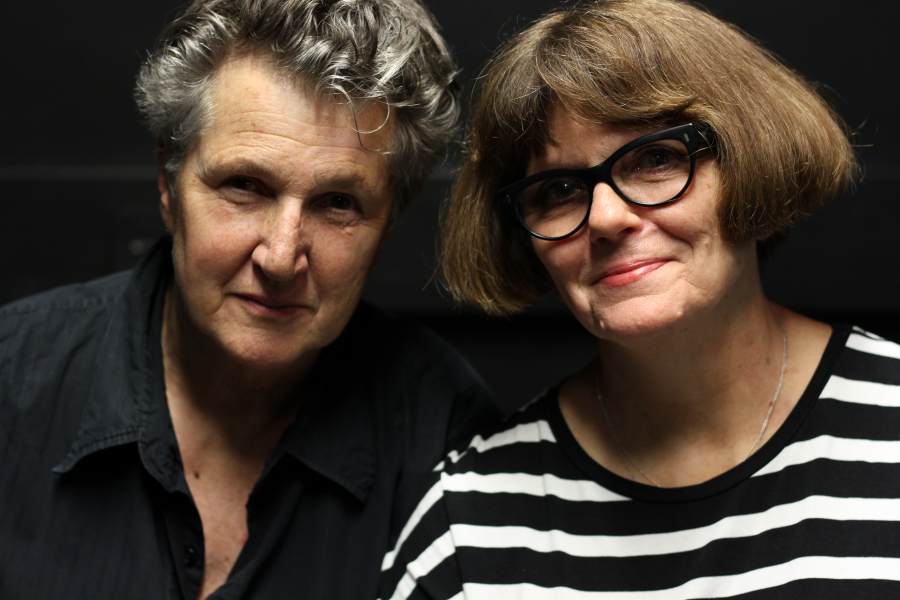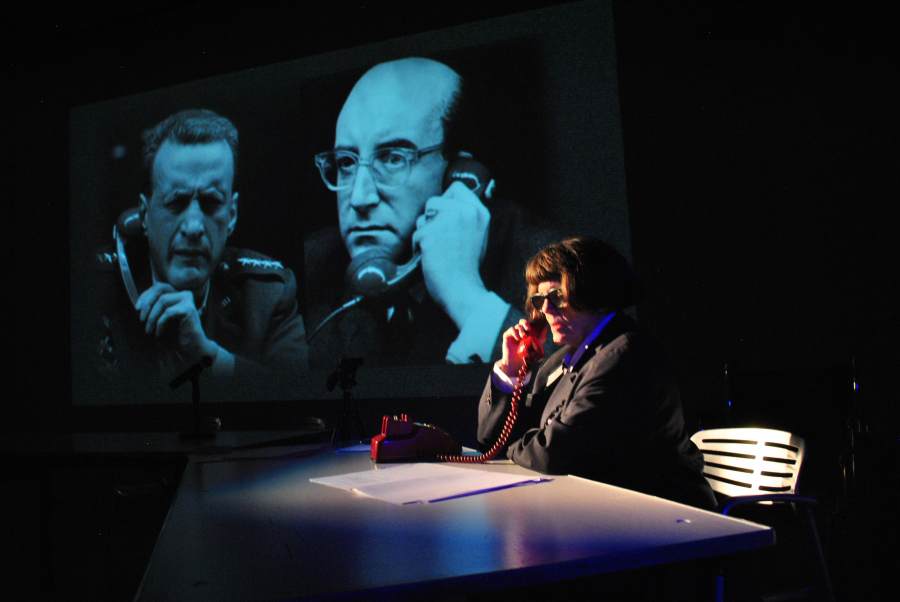

Since 1980 Split Britches have been turning the theatre world on its head with their unique takes on literary classics, film, and performance art. They return to the New York stage in 2018 with Unexploded Ordnances (UXO) an exploration of the end of days inspired by Stanley Kubrick's masterpiece Dr. Strangelove: Or How I Learned to Stop Worrying and Love the Bomb. Working with the notions of hidden desires, the ways in which we communicate, and an ominous countdown, UXO sees the duo of Peggy Shaw and Lois Weaver directly interact with audience members who become part of a special council in which they become co-conspirators in what is sure to be yet another unforgettable theatrical experience with Split Britches. We spoke to them about the themes in the show, how their creative process has changed, and what they're looking forward to as they present this show in NYC.
The notion of not knowing what world I’ll come out to after going to a show has never been as present as it has been this year. Do you find that by dealing with your fears through your art you’re able to make better sense of them?
Peggy Shaw: No. Is this a yes or no answer? No.
Lois Weaver: Well we’ve always done that. We’ve always used performance as a way to confront things going on. Like when Peggy did Menopausal Gentleman it was about how to deal with going through menopause as a butch woman. When we did Upwardly Mobile Home we were dealing with the economics of the Reagan Thatcher era and what that meant to be artists… and we were feminists and the pornography debate was happening and we made a piece called Little Women: The Tragedy to help us basically in some ways stage that debate for ourselves so that we can understand the conflicts. So we’ve always used our performance to help us understand the world. In this case I think it’s even more so because we were involving other people to talk about their fears and concerns as well. So it’s not just us talking about ours we get to engage with other people doing that.
Shaw: It’s also our desires. We don’t base our shows on our fears. We figure out a way to positively use our desires to create a show and sometimes our fears might come in, especially about performance and combining performance with social engagement, but we don’t base our shows on fears.
Dr. Strangelove is a great inspiration for UXO, what made the film’s structure so attractive to you?
Shaw: I’ve always loved the movie and I just got obsessed with it. And there’s one woman who’s in it for 30 seconds… and everyone else is a man so I thought that was pretty interesting. And the film shows what idiots these men are and bureaucrats and politicians in power and the nuclear bomb. It’s a beautiful ironical piece and Stanley Kubrick brings out all of the problems with nuclear power and with government.
Weaver: And to go back to what you said, to the first question about desire we always work from our desires or our fantasy or our obsession, so Peggy got obsessed with Dr. Strangelove thinking oh this would be a good piece for us to work from and … then had the desire to have herself play George C. Scott and sort of get into the body of what that character was. And we were sort of looking in the direction of something like Dr. Strangelove because we’d already decided on the theme of unexploded ordnances, which had a military aspect to it so we wanted to look at… unexplored potential in elders but also kind of the potential of maybe disaster whether it’s climate disaster, nuclear disaster, military disaster - we started to look at military concepts. So it fit right in. And also the humor really fit our style.
What other Stanley Kubrick movies would you like to explore through your own work?
Weaver: We don’t work like that. We’ve used films before but they all respond to a theme first and the film later. So we worked with A Streetcar Named Desire, and The Bitter Tears of Petra von Kant, The Servant, Little Women actually as a written piece but also as a film. So, you know, we’ve – the idea the theme or the desire to ask a question comes first and then the film comes later so… yes the answer is no, but you never know! It could come up.
What’s the most nerve wracking countdown you’ve experienced?
Shaw: The dentist saying that she’s going to do a filling now. That’s the most nerve wracking countdown.

How has your work dynamic changed during the time you’ve been doing art together?
Shaw: [laughs] We’ll put forty years in a couple of sentences here. Forty years doing art and doing life together – we haven’t changed at all but the world has. But as far as we’re concerned we’re the same as we were when we were thirty.
Weaver: Well I think our process has gotten faster. That’s one thing. I mean I think that after, certainly after forty years, but probably after twenty five years, our process became so natural and we began to trust our impulses a lot more. So we’ve gotten to the point where we can make pieces in less time because of that. We always managed to get along pretty well in a work environment but we do have conflicts and we still have conflicts. I think maybe if anything has changed we recognize when those conflicts come up and know that they aren’t the end of the world, that they go away.
Shaw: And that’s what makes it so good is our diverse opinions. The fact that we don’t ever agree on anything.
Weaver: That’s not true that we don’t ever agree.
[both laugh]
Can you comment on the importance of queer art in the aftermath of Brexit and the US Election?
Weaver: Well I think any expression of difference is essential particularly in a time when difference is at risk. When people are actually at risk for being a different race or a different sexual orientation or a different gender. So I think we have to be more visible than ever – and I think that our work has always been about visibility. Not that it’s been about being queer. We’ve never made work just about being queer. We’ve made work as queer artists and using a queer perspective to think through other ideas. And I think that’s also important that the queer and feminist perspective and thought process is essential right now when there’s so much desire to return to that kind of homogeneous 1950s world of both Britain and the US. So I think that those are the things that are really important. The work itself – it’s about doing the work and about being out in the world in the work that’s the most important thing for me.
Shaw: It’s also about expanding our thinking. Because obviously our thinking hasn’t done so well in the past, not mine, ours, governments don’t think too well so queer people think better than other people. [laughs] So. That’s the good thing is people are able through feeling empowered to imagine better systems –
Weaver: Well, alternative systems.
Shaw: And be more inclusive. And get a passport.
What are you looking forward to the most about presenting UXO at the Under the Radar Festival?
Weaver: Seeing who comes. Because the audience is such an essential part of it and because the festival time in New York in January brings so many people from so many different places. So it won’t be just a New York audience which is great. I love a New York audience because it’s so wacky and diverse and open. But this’ll be a really wide ranging audience and that’s exciting.
Shaw: It’s also at our home base, La Mama. So we’re presenting it here and we’re comfortable doing that. And it’s nice to invite people into your home. And La Mama is very excited, as well as we are, to have a different type of audience. I think it is the audience.
For more and information and tickets to Unexploded Ordnances click here.